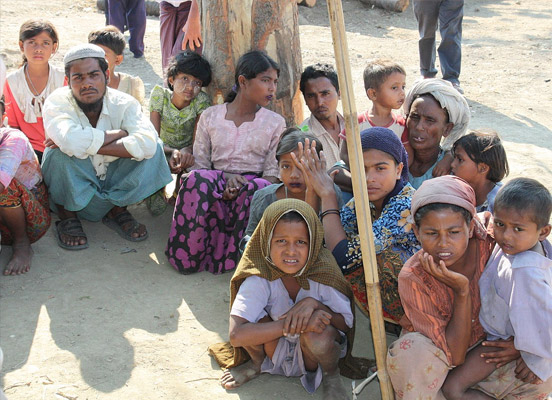
New York: Having faced decades of discrimination and repression under successive Myanmar authorities, the situation remains dire for the Muslim minority Rohingyas who have
been bearing the brunt of fighting between the military and an ethnic armed group.
Spiraling violence and a weekend of widespread arson attacks in the western state of Rakhine in recent days have deepened the humanitarian crisis, displacing tens of thousands of people and causing large-scale destruction of homes.
The estimated 600,000 Rohingyas in Rakhine, formerly Arakan, have been effectively denied citizenship under the 1982 Citizenship Law, and remain one of the largest stateless populations in the world. Following the 2021 coup, the predominantly Buddhist country has been in turmoil, with its military battling a widening civil war against ethnic armed groups and people’s resistance forces.
The Arakan Army (AA), which is one of the several armed ethnic minority groups based in Rakhine state, is believed to have about 30,000 troops. The group said last week that it has won control over Buthidaung town in Rakhine after weeks of fighting.
Claiming to be fighting for more autonomy for the Rakhine population, AA denied allegations that it had targeted members of the Rohingya community during the offensive.
“The entire town is burning,” Nay San Lwin, a Rohingya activist originally from Buthidaung, and co-founder of the Free Rohingya Coalition, was quoted as saying on CNN. “Few houses remain intact, only a few.”
Rohingya activists and organizations have urged the international community to take immediate action to protect the persecuted ethnic minority from further displacement, violence, and potential mass atrocities.
In a joint statement released on May 22, it said thousands of Rohingya have been internally displaced in Buthidaung and Maungdaw townships and many have been asked to leave the town of Buthidaung by AA on May 18. The statement claimed that AA soldiers fired shots overhead and looted and burned houses, forcing thousands of these people -- including women, children, and the elderly -- to flee for their lives.
A Rohingya refugee in neighboring Bangladesh told CNN that most of his family were still in Buthidaung but he has not been able to reach them since late last week. “Then, my brother-in-law told me that my family was displaced, and my home was burned down by the Arakan Army,” he told the news channel.
Nay San told Al Jazeera that “as of now, people are still on the road looking for a safe place. There is no food or medicine at all. Most of them couldn’t carry their personal belongings”.
Many of them have begun to flee with at least 47 of them having entered Mizoram’s Lawngtlai district from Paletwa, a southern township in Myanmar’s Chin State, intelligence sources confirmed to The Print, a news outlet in India.
Reacting to the grim situation, the United States said it was deeply troubled by increasing violence and intercommunal tension in Rakhine, adding that it raised the risk of atrocities being committed.
"The military's previous acts of genocide and other crimes against humanity targeting Rohingya, in addition to its history of stoking intercommunal tensions in Rakhine State and elsewhere across the country, underscore the grave dangers to civilians," State Department spokesman Matthew Miller said in a statement.
UN Special Rapporteur Tom Andrews said that the world is again failing the Rohingya in their hour of desperate need in northern Rakhine State. "Emergency aid must be allowed in and those running for their lives must be allowed out by opening the Bangladesh border and supporting those able to escape," he said in a message posted on X.